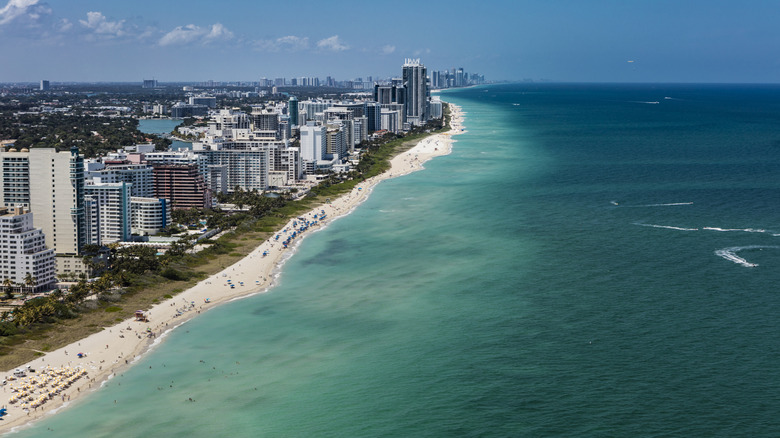The US State That Ranked First For It's Economy Is One Of The Best Places To Live In 2025
The United States is the largest economy in the world, with a gross domestic product (GDP) of over $30 trillion, according to the International Monetary Fund. While this figure can be difficult to comprehend, breaking down America's total GDP by state can help clarify how the economic output of each contributes to the country's overall economic standing. According to U.S. News & World Report, the top five states with the best economies based on economic output, labor market, and overall business growth are: Florida at No. 1, Texas at No. 2, Utah at No. 3, Idaho at No. 4, and Arizona at No. 5.
Florida's total GDP was around $1.7 trillion in 2024. The state's labor market played a major role in this. According to the Florida Chamber of Commerce, the state's workforce is now larger than the total population of 40 U.S. states. Florida also remains a nationwide leader in new business growth. According to the Office of the Governor Ron DeSantis, entrepreneurs and companies have launched over 3 million businesses in the state over the last 6 years, with more than 260,000 new filings in 2024 alone. But a great economy is not all Florida has to offer. It was also ranked the No. 6 best state to live in by Business Insider and the No. 6 best state overall by U.S. News & World Report.
The benefits of living in Florida
The first and most obvious benefit that comes from living in Florida can be found in its nickname: "The Sunshine State." Known for its wide array of palm trees and beaches, living in Florida presents an opportunity to enjoy year-round warm temperatures. For example, according to the National Centers for Environmental Information, the state's average annual temperature consistently remains in the low 70s Fahrenheit. As a peninsula, Florida possesses a total 1,350 miles of coastline and 663 miles of beaches, according to the Florida Department of State. These statistics are part of why it is hailed as one of the best states to retire, but the reasons don't end there.
There are also an abundance of tax benefits that come with living in Florida. These include no state income tax, no inheritance or property taxes, no tax on Social Security benefits, and no taxes on income from investments. Although the state does have a 6% sales tax, most groceries are exempt from this other than ready-to-eat items like pre-made sandwiches, according to the Florida Department of Revenue. Both prescription and non-prescription drugs are also exempt from tax in Florida, along with infant supplies like diapers and baby formula. A variety of different medical items like crutches and hearing aids are tax-free as well.
Cost of living in Florida
Although warm weather and tax incentives provide a great quality of life in Florida, there can be a few tradeoffs depending on where you live. For example, the overall cost of living in the state is 2% higher than the national average, with housing and food costs both 4% higher, according to RentCafe. Fortunately these numbers are not uniform throughout the whole state. Instead they are largely offset by the prices of larger cities like Miami and Fort Lauderdale, which both have a cost of living over 20% higher than the national average.
Cities like Jacksonville and Tallahassee both have a cost of living 7% lower than the national average, while Punta Gorda and Orlando both cost 4% lower. BestPlaces also reports that Crystal River, a charming coastal town with affordable housing, has a cost of living that is 12% lower than the national average. According to Niche, the top five most affordable Florida counties in 2025 are: Dixie County at No. 1, Holmes County at No. 2, Lafayette County at No. 3, Hamilton County at No. 4, and Calhoun County at No. 5. The median home price is under $120,000 in all of these counties. This is well below the state's median home listing price of $440,000, as of April 2025, according to the Federal Reserve Bank of St. Louis. The median rent price in all these counties is below $900 as well, significantly less than Florida's April 2025 statewide rent price of $2,100, according to local Florida realtor, Edward DiMarco.


